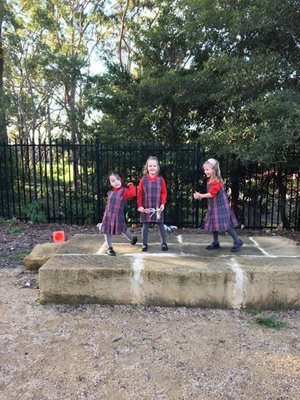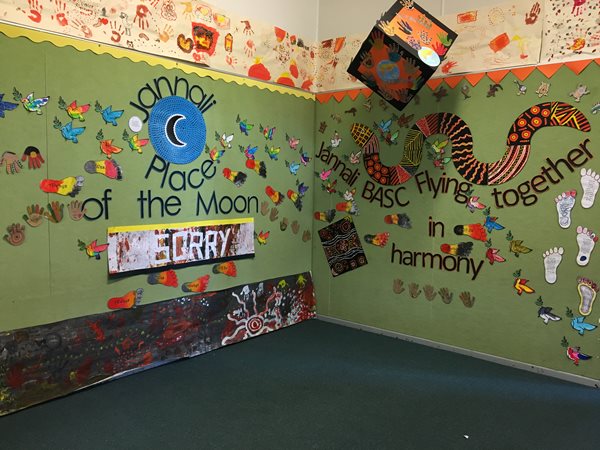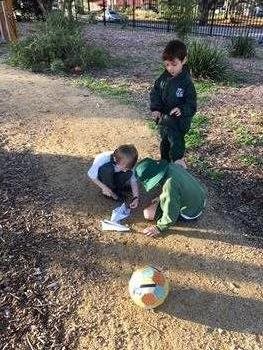We recently shared how self-assessment can be of benefit to the Assessment and Rating process, and how a new working document has been developed to support services through the self-assessment process.
This week we speak with Jannali Before and After School Care (BASC), who used the opt-in self-assessment tool earlier this year and achieved an improvement in their rating from Meeting to Exceeding.
 Jannali Before and After School Care (BASC) was established in 1998 and is run by the Jannali P&C Association. It’s located on the grounds of Jannali Public School, providing quality care and activities for up to 60 children from kindergarten to year 6. The centre has a team of five permanent educators and four regular casuals.
Jannali Before and After School Care (BASC) was established in 1998 and is run by the Jannali P&C Association. It’s located on the grounds of Jannali Public School, providing quality care and activities for up to 60 children from kindergarten to year 6. The centre has a team of five permanent educators and four regular casuals.
Jannali BASC received their A&R notice in October 2019, while operating with a rating of Meeting.
“We were missing our usual centre Coordinator at the time,” says Bronwyn Hearnden, who stepped in as Acting Co-ordinator. “Looking at the QIP it appeared that aspects of each Quality Area required considerable improvement. Neither myself nor the current team had been involved in the previous Assessment & Rating or the development of the QIP, so it was the first time for all of us. Our initial goal was to ensure we achieved meeting in all areas.”
An opportunity for a fresh start and a new look at the quality improvement process
A week after the original notification, the team received an offer to opt-in to the self-assessment process.
“We collaborated with the P&C and our team of educators to opt-in, as we saw an opportunity to engage in a new and exciting format,” shares Bronwyn.
As the team began to work through the process of self-assessment, they quickly realised that it would be beneficial to start the process from scratch, leaving the existing QIP aside.
“The QIP had been written in isolation, without the involvement of the team,” says Fran St John, Assistant Co-ordinator. “As we worked through the process we realised that it didn’t accurately represent the centre and the work that we do. We were having to find a lot of evidence to demonstrate how we did things and re-look at the language we used. We used the Guide to the NQF as a support to help identify and provide evidence for the exceeding themes in each area.”

Fran and Bronwyn believe that the decision to opt-in to self-assessment opened up the opportunity to re-look at the entire quality improvement process and how it could be integrated into everyday practice.
“We now have regular catch-ups on the QIP with the entire team, in order to agree on what we can highlight and work on,” says Fran. “All the staff are now at the point where they are more confident in their involvement with it and are able to give regular input. We have a diary that we all contribute to on a weekly basis, which informs what our entries to our QIP will be.
We will now be in a position where we will always be prepared with documentation and how to present it because we’re making sure that we keep all the evidence current and to hand.
When opting into the new self-assessment process, services have the opportunity to contact the NSW Regulatory Authority Quality Support Team’s authorised officers. These officers work with services to guide them to prepare for Assessment and Rating including supporting the unpacking of service strengths from their quality improvement template, the identification of key practices against the elements of the NQS, and exploring how areas of improvement are visible in the service. Jannali BASC had several phone conversations and emails with their nominated support person, who Bronwyn says was extremely helpful in setting them on the right path without telling them what to write.
Opening doors to greater aspirations
 “From an Approved Provider perspective, the new self-assessment tool was much easier to understand,” says Julie Robinson, Approved Provider and P&C member. “It was clearer in terms of being able to provide specific examples related to each standard.
“From an Approved Provider perspective, the new self-assessment tool was much easier to understand,” says Julie Robinson, Approved Provider and P&C member. “It was clearer in terms of being able to provide specific examples related to each standard.
“Once we understood the process of explaining the ‘how, why and when’ of the identified practice and collecting the evidence, we methodically worked through each standard and element,” explained Bronwyn. “We became more confident of our practice and supporting evidence and agreed to lift our aspirations to aim instead for an Exceeding rating,”
The visit occurred in January 2020 during that summer’s vacation care program. While the visit was initially scheduled over two days, it ended up being condensed into one long day from 8am to 7pm.
“It was a whole new adventure for us and we threw everything into it to achieve our goal, and we certainly learnt a lot along the way,” says Julie.
As a result of the process, Jannali BASC achieved an improved rating of Exceeding which includes:
- QA1 Educational program and practice – Meeting- 1.1 Meeting, 1.2 Meeting, 1.3 Exceeding
- QA2 Children’s health and safety – Meeting- 2.1 meeting, 2.2 Exceeding
- QA3 Physical environment – Meeting- 3.1 Meeting, 3.2 Exceeding
- QA4 Staffing arrangements – Exceeding
- QA5 – Relationships with children – Exceeding
- QA6 – Collaborative partnerships with families and communities – Exceeding
- QA7 – Governance and leadership – Exceeding
Recommendations for others
“If you’re considering whether to opt into self-assessment, just go for it,” says Bronwyn. “We found it an easier process to identify and express your strengths and practices.”
Bronwyn offers the following recommendations to anybody considering the self-assessment process:
- Don’t wait until you receive your notice to get started on the self-assessment process.
- Become familiar with The Guide to the NQF and My Time Our Place and the words and terminology used within them.
- Ensure that you write everything from a positive angle eg: ‘We do this’ rather than ‘We try to do this’.
- Always gather your supporting evidence as you go.
- When filling in the form online – save regularly (the team at Jannali BASC didn’t save often enough and lost some work along the way).
About CELA
Community Early Learning Australia is a not for profit organisation with a focus on amplifying the value of early learning for every child across Australia - representing our members and uniting our sector as a force for quality education and care.